Sengoku – Review
by Ste
|
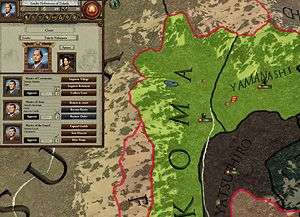 It’s Japan 1467 and the very start of the Sengoku Jidai (Warring States) period in Japan’s history. You must rise as a Noblemen in one of Japan’s many clans, gaining influence within your clan and eventually becoming its Daimyo; after that it’s your ultimate goal to go on and become the new Shogun Warlord of Japan. Developed and published by Paradox Interactive, Sengoku is a grand strategy game of epic proportions, spanning from 1467 to 1620 and played from a top down perspective of a very detailed 3D map of Japan. You take direct control of one character and in order to win you must orchestrate their rise to power using martial and diplomatic prowess as well as intrigue, all the while staying as honorable as possible.
It’s Japan 1467 and the very start of the Sengoku Jidai (Warring States) period in Japan’s history. You must rise as a Noblemen in one of Japan’s many clans, gaining influence within your clan and eventually becoming its Daimyo; after that it’s your ultimate goal to go on and become the new Shogun Warlord of Japan. Developed and published by Paradox Interactive, Sengoku is a grand strategy game of epic proportions, spanning from 1467 to 1620 and played from a top down perspective of a very detailed 3D map of Japan. You take direct control of one character and in order to win you must orchestrate their rise to power using martial and diplomatic prowess as well as intrigue, all the while staying as honorable as possible.
It would be very easy to think that Sengoku is just a Shogun Total War wannabe and then dismiss it as such but, apart from the setting of the game and the end goal, Sengoku is anything but a Total War game. For a start, time in the game continually ticks along as you play and make decisions; it can be paused and you can give orders, however nothing will actually happen until the game is un-paused again. Things can take a while to happen, thankfully there is an option to increase or decrease the game’s speed while you are waiting for things to happen. The amount of information made available to you from the very beginning is also astronomical compared to the likes of Shogun Total War. The map alone has eight different settings to choose from that give you at-a-glance information on everything from diplomatic status to terrain types. There is also information about your family, your clan, your fellow noblemen, your provinces, the list goes on. Additionally, the combat isn’t anything like Total War’s offering, instead, here you raise troops and simply tell them where to go and the AI takes care of the rest based on the number and quality of your troops compared to the enemies you are fighting. I’ll be honest, this game is extremely complicated and unless you like pouring over numbers and percentages you will not enjoy it. For those of you brave enough to try it, or you like this kind of title, you can gain a huge sense of achievement from playing Sengoku once past the initial barrage of information.
To begin with you are asked to choose a character to play and there are literally hundreds to choose from, each one giving a different experience from the next. You could choose to start as a Nobleman who controls only one province or, alternatively, you could be his Daimyo or even his Clan Leader. The clan you choose could be at war or at peace, rich or poor, etc. It was pleasantly surprising to be given so much choice from the get set. The game will tell you briefly who the playable characters are and gives an approximation of how difficult playing as him will be via a handy little bar which shows a skull and cross-bones on one side and a baby’s dummy on the other, signifying the difficulty level. Once you have finally chosen your character, you will be asked to assign members of your household to positions in your ‘court’ who will help you to rule your provinces. There are three positions that need filling: Master of Ceremonies, who will act as your main diplomat and also improve your provinces’ facilities so that a higher amount of tax can be generated; Master of Arms who will upgrade your castles as well as recruit troops and quell any rebellions within your provinces, and finally the Master of the Guard, who will look after your character’s personal safety as well as hire ninjas to do your dirty work for you.
As previously mentioned, you only control your own character, the members of your court can be given orders but how well or badly they perform will be down to their personal stats. So as an example, a good Master of Arms would be somebody with a high Martial stat, while a good Master of Ceremonies would be somebody with a high diplomatic stat. You will find that these three guys will do most of your work for you, as such it is quite important to have the best people available. From time to time better candidates for the roles will present themselves and it is advisable to swap them around for better people if possible. Setting your Masters to work is simple enough: select the court screen and assign each one a task and a province to do it in and he will go there and do it. As time goes by your villages, castles and armies will slowly improve giving you more political oomph with which to climb the ladder of power.
One of Sengoku’s more interesting features is the ability to partake in plots. For example, plotting to become a local Daimyo or Clan leader requires you to seek out political supporters from your fellow noblemen and then convincing them to support you in your scheme. Support is gained in a number of ways, for example you can give out land titles, arrange a marriage, give up a hostage or simply pay gold to other noblemen for the promise of their backing. Once you have gathered enough support you can overthrow whoever is currently in power and take up their role. It’s a very interesting mechanic and something which I personally have not seen before. Of course, plots against you are also possible and it’s up to the skill of your Master of the Guard to sniff them out; it is possible for people that you have overthrown to later plot against you in turn. If a plot by yourself or against another is discovered, it can either be exposed publicly, causing great personal shame and lack of honor, or it can be dealt with more directly by having ninjas sent off to assassinate the would be schemers. Plots to attack other clans are similar in nature, however with these it is military strength you must amass rather than political support. Being able to gather such support all depends on how well you keep your Masters working, and as you gain more power better Masters become available, thus allowing you to get involved in more complex plots.
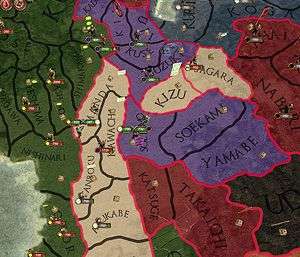 In order to stop you from hatching plots left, right and centre and generally making a huge mess of things, every one you undertake costs a certain amount of honor. Honor acts like an action point system so if you do not have enough honor points for a certain plot then you can not undertake the action. Honor can be earned in a number of ways, including building certain religious buildings or giving out gifts and titles etc. Caution is needed, however, because should your honor reach zero you may be asked to perform seppuku (ritual suicide) by your peers. Should this be the case, and you have male heirs old enough to take over from you, it is worth sometimes letting this happen as your heir will receive a bonus to his honor due to his father taking himself out in an honorable fashion, but if you don’t have a male heir of age this means game over.
In order to stop you from hatching plots left, right and centre and generally making a huge mess of things, every one you undertake costs a certain amount of honor. Honor acts like an action point system so if you do not have enough honor points for a certain plot then you can not undertake the action. Honor can be earned in a number of ways, including building certain religious buildings or giving out gifts and titles etc. Caution is needed, however, because should your honor reach zero you may be asked to perform seppuku (ritual suicide) by your peers. Should this be the case, and you have male heirs old enough to take over from you, it is worth sometimes letting this happen as your heir will receive a bonus to his honor due to his father taking himself out in an honorable fashion, but if you don’t have a male heir of age this means game over.
The character progression system is very good and your character will gain different traits as time goes by based on decisions you make. These traits can give either bonuses or penalties which affect how the AI characters react to you. In one of my early games my character was a clan leader of over 60 years old. Because I didn’t really have a decent grasp of the game at the time I was trying to get one of my Daimyo’s to commit seppuku so I could take over his lands. As the Daimyo’s honor was too high for this he refused me and a little while later I received the ‘infirm’ trait which made my peers lose some respect for me. Stupid old man.
As I mentioned before, if you don’t have a male heir to take over from you it’s game over, so if you’re a bit of a pervert like me you’ll enjoy looking at the, ahem, stats of potential wives. Any children you bear will receive a blend of stats based on the two parents, so if you and your wife are a bit slow then chances are your kids will be as thick as two short planks. To mix it up somewhat there is an invisible stat for fertility to complicate matters – it might be that your perfect wife is a bit of a seedless jaffa and you won’t be able to knock her up. Luckily the game allows you to have up to four wives just in case… (poor sod).
As time passes you will gradually become more powerful, generation by generation, attacking other clans and assimilating their lands into your own. Once you control 50% of country you are able to become the Shogun if you wish. However, when you do all hell breaks loose. Much like the Realm Divide mechanic in Total War Shogun 2, the rest of the country clubs together and decides that you need a good kicking, but if you can somehow hold on for three years then you will win the game. I found that in this situation its best that you go well beyond the 50% threshold before claiming the Shogunate as the AI really does go for you, and unless you are massively powerful you’re going to lose!
Graphically, Sengoku is nothing to write home about; the ‘fully 3D’ map is rather simplistic at best and the animation for the soldiers is just ugly. I can only describe the menus and tabs as functional, however some effort has gone into making some of the icons, and perhaps the nicest looking thing in the game are actually the spinning icons that represent the position of your court members. Other than that, it generally looks horrible. Saying that though, I can forgive the crap graphics as under the hood this is a solid, in-depth title and the lack of pretty things on screen can easily be overlooked. Additionally the music isn’t that bad, there are a good number of different period pieces and they all fit well with the theme.
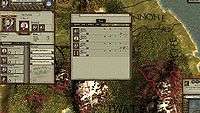 |
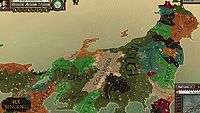 |
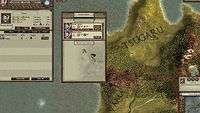 |
 |
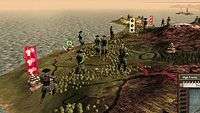 |
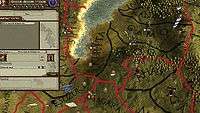 |
There is actually a multiplayer element to Sengoku, but I don’t think it’s worth much more than a mention. The reason for this is because this type of game isn’t really made for multiplayer in my opinion, it’s too long winded and involving. That plus the horribly old fashioned way of setting up a game means that most people probably won’t bother with it. To join someone’s game you first need to know their IP address, which is not a problem if you know someone else who has the game and wants to play, however it’s not practical if you don’t know anybody else with it. I think for a multiplayer element of this title to work, a shortened version of the game, along with a method of finding random opponents would have worked well, unfortunately that is not the case here.
Pros- Extremely in-depth and rewarding gameplay
- Unique plot system
- Can play as any character, thus offering endless replayability
- Lots of graphs, stats and figures to pour over
- You can have 4 wives!
- Definitely a niche game, you will either love it or hate it
- Graphics are awful, not one for the graphics whores
- Will be too complicated for some
- Poorly thought out multiplayer element
- You might get 4 wives!
I can't really pick fault with this game for what it is, but it is definitely not for everyone. It's certainly a niche title but if it's a deep, absorbing grand strategy title you are after and you are a more of a content over presentation kind of person then Sengoku delivers in droves. I highly recommend studying the 80+ page manual before getting stuck in though, as the review code that I played did not have a tutorial and you will get lost in the menus if you just simply dive in.
Last five articles by Ste
- Acoustic Gaming: X-Wing Miniatures Game - Review
- Acoustic Gaming: Pandemic Legacy – Season One
- Bored Gaming
- U Wot Mate?
- Tabletop Simulator - Review















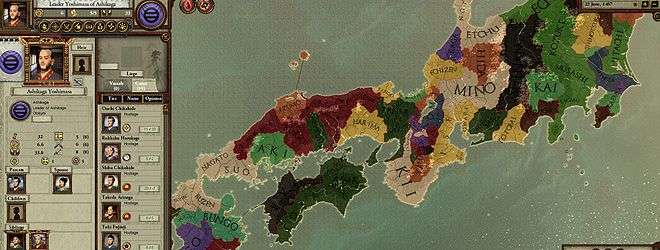
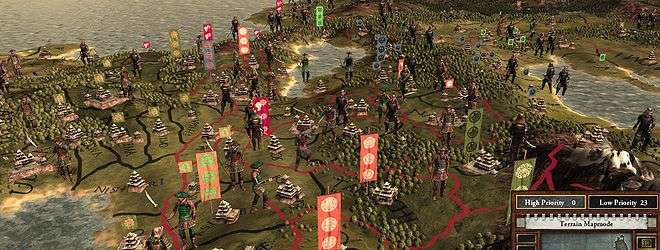
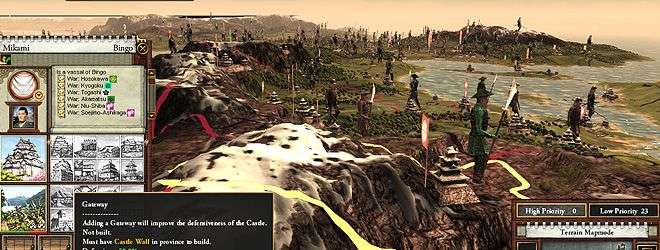






Real testament to the game that the graphics may be crap but it doesn’t affect the gameplay. I haven’t really played these management type games in recent years, with the only one being Conquest Of The Americas but I got a real kick out of that one so I may just give this a go. It’d be my first ancient Japanese game too, and I may end up bumping into that little guy from Heroes!
You’re a funny guy mate, made me smile a few times and I wasn’t expecting that from a game like this
Excellent review once again Ste! It’s a fairly interesting game and from what you’ve said about it, I actually find it a bit more interesting than the Total War games, so I might have to give this a look at some point in the future
Thanks for the comments guys, despite not being all action all the time this game is fun. As long as you don’t go into this expecting a fast paced thriller of a game and you like a slow steady build up you will enjoy Sengoku.
This game gives me a headache just looking at it. I have, thus far, tending to avoid games like Total War and Sengoku as they look like massively complex time sinks. I tend to like starting these sort of titles when I have a good stretch of uninterrupted time ahead of me, like a weekend, as it tends to vanish fast when you get stuck into stuff like this. It doesn’t look too impressive, but I suppose the gameplay is where it counts here. Also… wife stats? What, like boob size and stuff?